Before I get into the main theme of this week's letter on scent, I am delighted to share the link to my feature interview and article on the Wisdom from the Sacred Heart of the World, a conversation with award-winning Colombian photographer Javier Vanegas. He shares his work and life lessons from the Kogui people of the Sierra Nevada de Santa Marta, where the Colombian Andes meet the Caribbean Coastline. I’m grateful to Rose Rouse and Advantages of Age for supporting and publishing my writing over the last few years.
I’m also grateful for the positive feedback I’ve had lately on my work, and my mid-week podcast meditation, which was a way to transmute some old shadow wounds triggered by the Scorpio full moon, and which resonated with other listeners too. There is always inner work to be done and released!
I’ve been thinking about scent—particularly perfume. As someone with synaesthesia and a highly sensitive nervous system, strong smells can often be overpowering. I don’t know how I managed to do adult personal care for severely disabled clients when I worked for social services, but I did. Humans can smell great, but we also emit some rank odours at times. I am no exception. Haha.
My immune system is sensitive, and so is my nervous system. Certain scents feel like they go straight to my brain—almost like a shockwave—but others, particularly those that are natural or plant-based, speak to me differently. Smell has always been deeply synaesthetic for me: it’s not just something I inhale, it’s something I see, something I feel, something that often brings an avalanche of memory.
I was dusting my collection of old perfume bottles this week. I’ve parted with some but kept others. Why? There’s a great deal of sentimentality in them—memory, place, emotion. And now, as I’m trying to lighten my load, I find myself asking: why am I still holding on to these empty bottles, or perfumes still half full but that are well past their sell-by date?
Perfumes in the bottle don’t hold their pristine notes forever. They fade or change. Perfume evolves with time. I’m not sure whether shelf life depends on the brand or the quality, but over time, the scent shifts; the alcohol evaporates, and the balance of notes transforms. Some turn sharp, almost acidic, some go musty, some just fade to a shadow.
I’ve also noticed that as I’ve aged, and as my sensitivity has increased, I can no longer wear highly synthetic, chemical-based perfumes. I wouldn’t want too anyway now. They make me feel physically unwell as they override my system. But I can wear essential oils, and I often do. Most of what I wear now are essential oil roll-ons, which I love. They lift up my mood if I’m feeling low and hold a kind of plant medicine that is healing, not just decorative. The essence of the plant has its own medicinal and energetic quality, and that’s what I tune into now. These aren’t just perfumes. They’re allies.
I’m fascinated by how important scent is—and how often we take it for granted. I remember when I had Covid, early in the pandemic in March 2020 when it had not long arrived on UK shores. I caught it in one of the very first waves, before we even had testing. Alongside the fever, the sweats, the strange hallucinatory dreams, and the bodily aches of flu that was like no flu I’d had before, there was one symptom that stood out: I lost my sense of taste and smell.
That was the strangest part. I remember thinking, why can’t I smell or taste my coffee? Why can’t I even smell myself? That’s when I knew—intuitively and physically—that I had Covid. Later, when I had Covid a second time, I didn’t lose my smell or taste, but with that first infection, the loss lasted for several weeks. And because taste and smell are linked, food felt… blank. Not bad, just somehow absent. It made me appreciate the role smell plays in our perception of the world.
Smell is tightly bound up with memory—and I think it is for many people. It can trigger so much so quickly. The smell of clothing, for instance—we all know what it’s like to wear something that isn’t ours. You can smell the person on it, even if they don’t wear perfume. We each have our own scent signature, something uniquely ours. And when we wear someone else’s unwashed clothes, something very intimate happens. Their scent starts to mingle with ours. It’s as though our skin and theirs begin a conversation. Our bodies share microbes, traces, and memory. It’s a quiet, invisible form of intimacy—almost animal-like. This is how we bond, this is how we grieve, this is how we feel someone’s absence.
I found this especially true in bereavement. When my mother died, one of the most painful tasks was packing up her wardrobe. Her clothes still smelt of her. She had a large wardrobe—like me—and choosing what to keep and what to part with felt impossible. I kept a few pieces, and even now, over seven years later, they still carry her scent. Wool, especially, holds scent beautifully. The same thing happened when my first husband left our home. He just walked out and I was left with his wardrobe for months. I decided that I would be the one to pack it up. It gave me a sense of ritual and control over my grief, a way of participating in that rupture, rather than being erased by it. I kept a t-shirt to remind me of what he smelled like in those early days of shock separation, as part of my grief process. Long since thrown out. Grief has a scent, and so does absence.
And perhaps because I never knew the smell of our son, I had to hold onto his smell a little longer—our son who died when he was tiny, born early, a tiny Tom Thumb of a baby. I never got to know his smell. I could only hold him for a short while. I could have held him longer, if I’d known then what I know now about how to be with death. Newborn babies have such a specific smell. It’s how we bond. The baby knows its mother’s smell. The mother knows her baby’s. It’s instinctual, biological, and ancestral. It’s about survival. Scent lets us know we’re safe, that we belong, that we’re home.
We can smell fear. Literally. When we’re afraid, our bodies emit a different chemical signature. That’s where the phrase “I could smell the fear” comes from. It’s real. Smell keeps us alive. It warns us, it calms us, it draws us closer.
There’s a wealth of academic research about all this—the science of the olfactory system, the way the olfactory bulb is wired directly into the limbic system, the seat of memory and emotion. That’s why a smell can bring us to tears before we even know why. It’s not just an association. It’s wiring which is built into us.
Coming back to perfume, I’ve been reflecting on the scents that have meant something to me over the years. I came across a picture of a bottle I used to love, though I threw the actual bottle away. It was a scent by a French house Etat Libre Orange that had made a perfume inspired by Rossy de Palma, the Spanish actress from many of my favourite Pedro Almodóvar’s films. The scent was beautiful—earthy, essential, rose-based. I found it in the Marais district of Paris. I now wish I still had that bottle.
I realised many of my favourite perfumes have rose oil in them. They’re often woody, earthy, and warm. That makes sense since I work with roses and rose energy. Another favourite was one I bought in the golden white sparkling ancient Scillian city of Ortigia—it had two leopards under a palm tree on the bottle. It’s an aquatic cologne, and it smells beautiful. Yet I find it almost overpowering, as it seems to have developed in strength. But the earth can take it ceremonially.
I used to wear Jo Malone a lot. One favourite was Black Cedarwood and Juniper. And for many years, my signature scent was Christian Dior’s Hypnotic Poison. I adored it. I still love the bottle—red and black, like a magical apple.
These days, I wear mostly roll-ons made with essential oils. My favourites are from Stag and Seer in Totnes. Their scents feel like protection. Cedar is important to me. My teacher and healer, Grey Wolf, Lobo, in San Miguel de Allende, Mexico taught me to anoint my chakras with cedar as a way of clearing and protecting. Frankincense is another powerful one, especially when I burn it during house clearings or rituals. I was taught this by Sandy Humby, who works with the beautiful frequency of the Rose energies and as a House Whisperer. She taught me how to identify and release stuck energy, including spirit energy.
I also love the smell of sage, Palo Santo, and copal. I remember picking fresh sage during the recent retreat in Colombia, and the smell was incredible, strong, alive, grounding. We made our cologne too, from seven sacred plants: tobacco, chamomile, rue, rosemary, and others whose names I have written down. We each carried our fermenting jars with us, infused with our energetic signature. I cried into the tobacco leaf that went into mine. Later, we buried the jars in the earth to brew in the dark mother. And when the scents were poured into our spray bottles, even though we’d all used the same ingredients, every single one smelled different. Mine carried the note of chamomile most strongly.
Flowers are essential to me and I buy a bunch of roses weekly. The scent of a rose fills me with joy, perhaps because my mother grew the most beautiful, scented roses. and they connect me with my maternal line. Lilies can be overpowering, but still beautiful. Bluebells in spring. The smell of freshly cut grass. The scent of damp earth and ionised air after the rain—especially when the rain comes after a dry spell. That smell of life returning.
And of course, every place, every land, has its scent. I remember arriving in Indonesia and the first thing I noticed was how different the land smelled. Of spices and clove cigarettes. Something warm and musky in the air. A completely different olfactory world.
I’m finishing this week’s letter from Chester, near Liverpool—once an important Roman settlement. There’s so much history and stories held in the land here, for future tellings. And, serendipitously, I stumbled into a branch of Penhaligon’s. Their perfumes are far beyond my everyday price range, but they are sumptuous and beautiful. My favourite is Duchess Rose, with its wolf bottle top. It smells heady, rich, velvety, and full of musk. I could eat it. It reminds me of exotic roses. However, although roses came originally from China, nothing quite compares to an English rose in June. That said, I was deeply impressed by the rose garden in Bogotá’s Botanic Gardens—such lush, strong, scented blooms in February! And the Rose Garden in Columbus, Ohio is another wonderfully heady place to while away time.

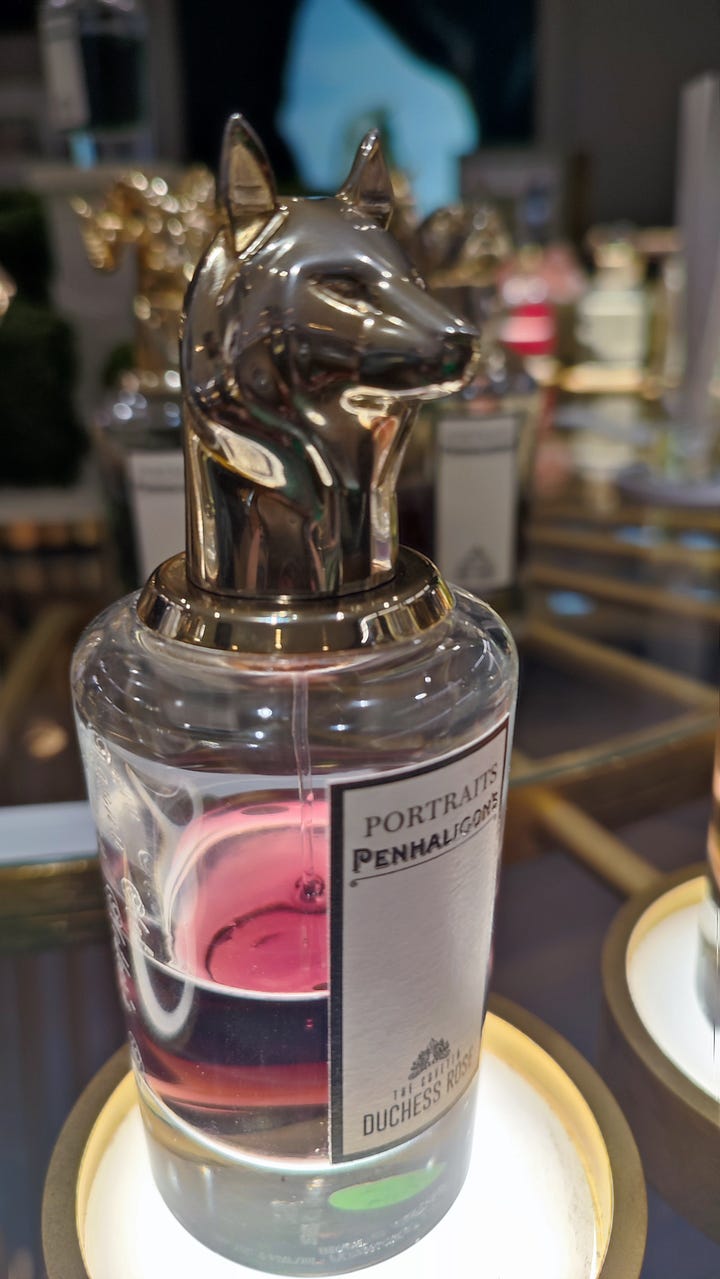
The base notes I return to—musk, sandalwood, frankincense, patchouli, cedar, rose—are like a scent signature of my life. I like fresh florals too, but they don’t carry the same nocturnal mystery. They don’t smell of the night, of full moons over Tintagel, of epic and tragic love stories, like that of Tristan and Isolde. I once wrote about my ancestral grandmother, Isabel Marshal, Countess of Cornwall, whose second husband, Richard—brother to King Henry—built her a walled garden at Tintagel inspired by the tale of courtly love that was the blockbuster of that era. It’s said he did it for love of the older, beautiful woman, who was his first wife, until she died in childbirth. I wrote about their story here.
The Romans knew all about scent. Many perfume bottles from their era still turn up in archaeological digs. I even have a fragment of Roman glass that washed up on the banks of the Thames—a tiny reminder that scent has always been part of our rituals and stories.
Today, I’ll anoint myself with my Temple Spray—tuberose, cardamom, sandalwood in spring water, with elm essence—before making an offering to the local Celtic-Roman goddess, Dee, on the riverbank.
Changing tack, a little to finish, I wanted to share the five-minute poem that emerged this morning from the monthly online That Sunday Morning Thing poetry group, led by poet Andy Jukes, a fellow graduate of the Wandering Court down on Dartmoor.
Rake and Comb
Comb me into your earth
take a strand of my hair
gossamer silks
fine as a spider’s web
spun in the birch forest
of silver thread
hung with dew drops
that sing your name
with crystal clear chimes
Rake me into your earth
cut with an Irish spade
releasing the odours of weathered bog bodies,
leathered with centuries of worm leaves
and mycelia
Dig me into your earth
plant my dried wood seed
into your volcanic rich soil,
red earth that brings the dead back to life
Water me with your tears
and I shall sing for you.
What are your favourite scents and smells, and why?
Do share in the comments.
Until next week
All my perfumed love
Serena xxx






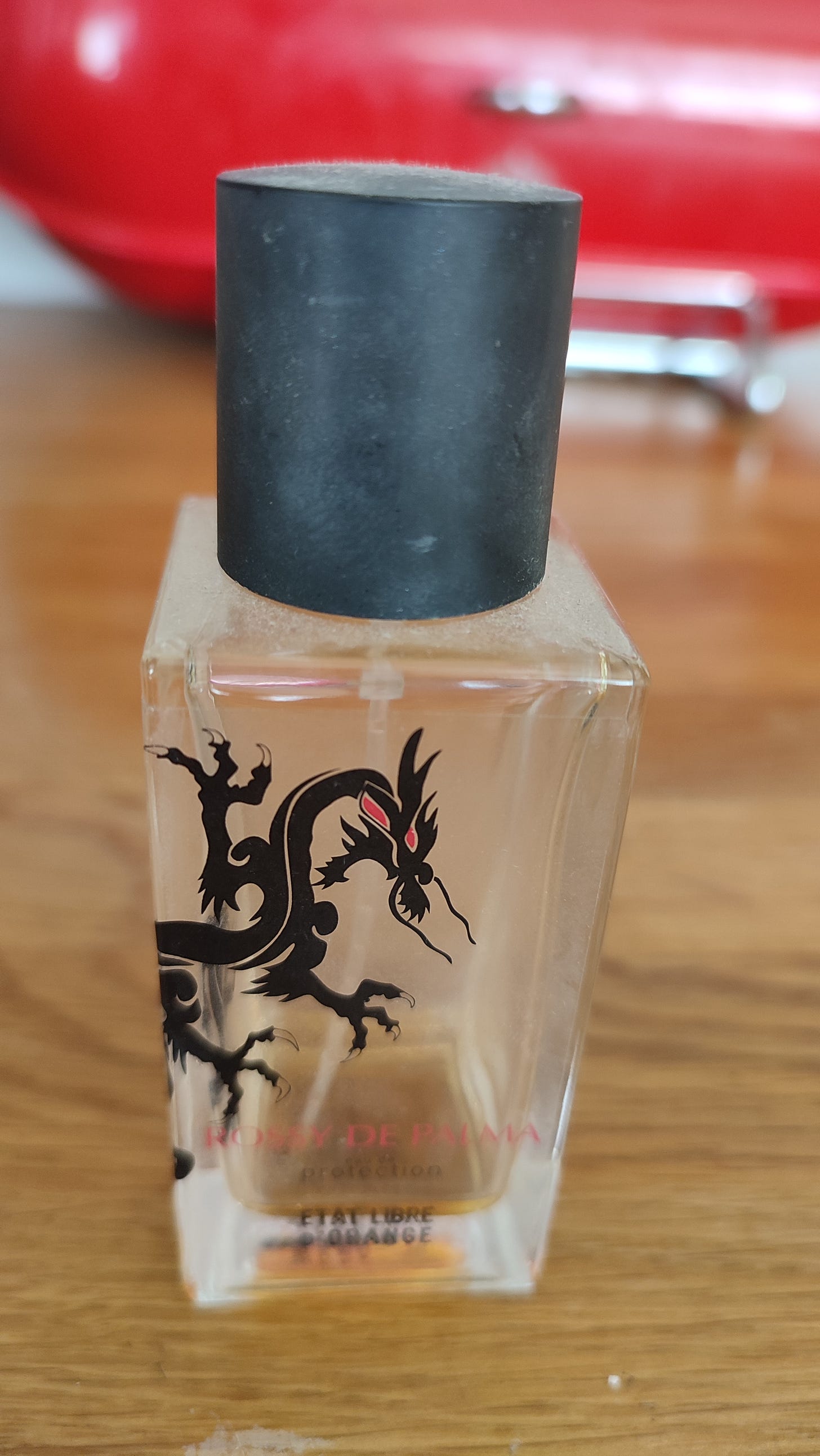
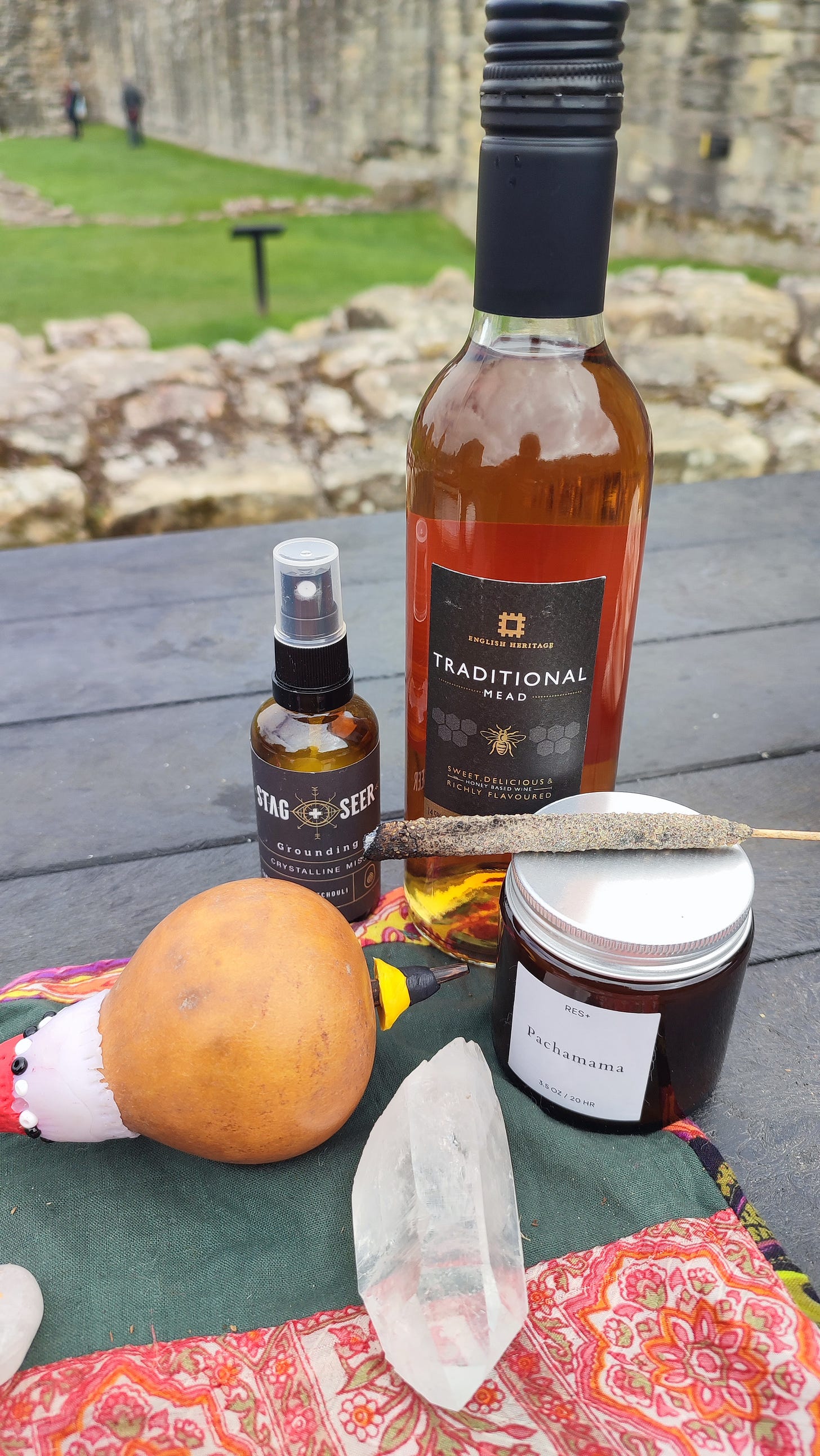
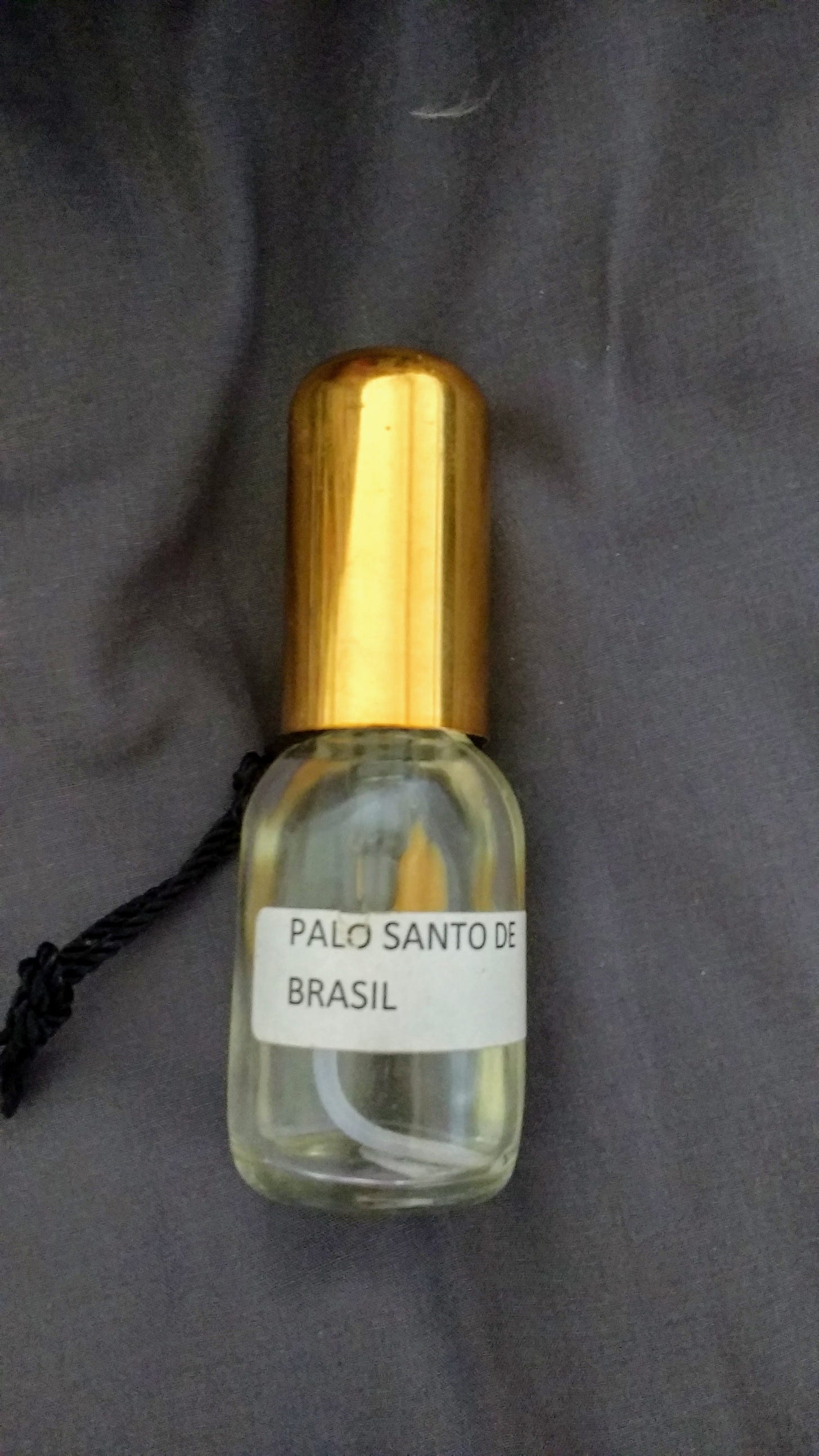
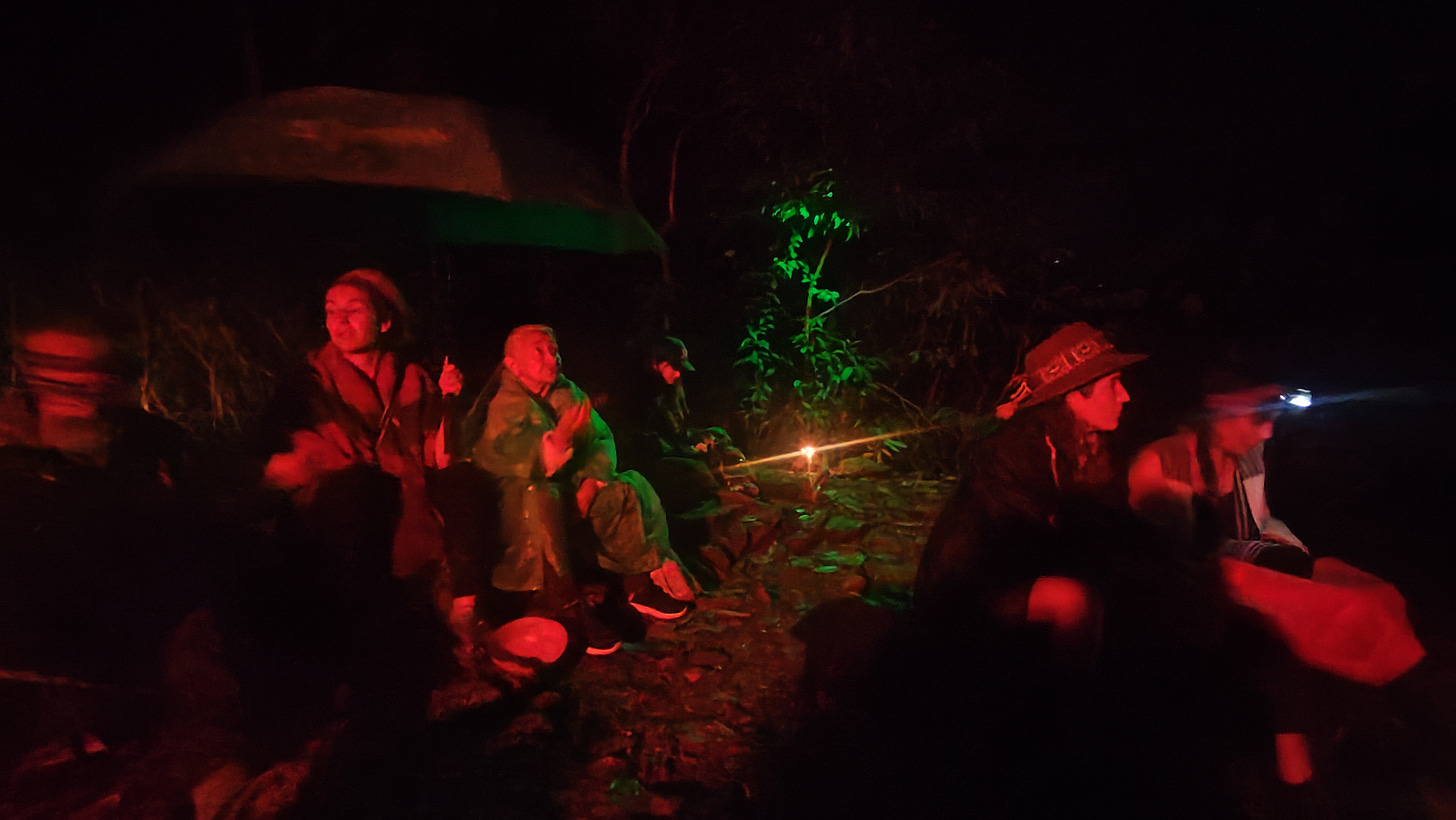

Lovely to have your company at TSMT this morning. I really like your poem. It sits well in this excellent piece of writing. Scent is a tricky subject for me. Parkinson's has robbed me of a reliable sense of smell and of taste. It's not a complete absence. It comes and goes. I was just pulling up some ground elder in our garden and was suddenly overwhelmed by a wave of scent - it was beautiful, fresh, lemony, bursting with life. It made me stop pulling the plant up, treating it as an adversary. I felt that it was asking for a little more of my intention than that. Thank you for your post. It's made me ponder the power of scent from some fresh angles.